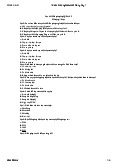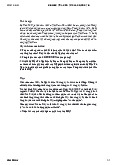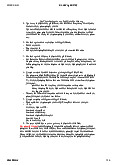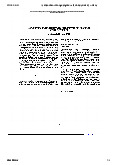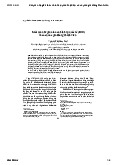







Preview text:
18:00 31/7/24
Tips for Reading.Học viện Ngoại Giao Việt Nam TIPS FOR READING
Collected & compiled by Lê Văn Khánh
Email: lekhanhhufs@gmail.com; Tel: 0983845579
Source: National Geographic – Cengage Learning
1. USEFUL WEBSITES FOR READING PRACTICE
While all reading is good, not all websites will be equally useful as preparation for your
reading exams. The list below is far from exhaustive, but it does focus on the sort of
websites that can be sources for the reading passages. BBC News www.bbc.co.uk/news The Guardian www.guardian.co.uk The Economist www.economist.com New Scientist www.newscientist.com Scientific American
www.scientificamerican.com American Scientist
www.americanscientist.com National Geographic
www.nationalgeographic.com Washington Post www.washingtonpost.com Sydney Morning Herald www.smh.com.au Wall Street Journal wsj.com/home-page Nature www.nature.com Forbes www.forbes.com
Harvard Business Review hbr.org Conservation
www.conservationmagazine.org Science Daily www.sciencedaily.com Management Today
www.managementtoday.co.uk
Scientific American Mind www.scientificamerican.com/sciammind History Today www.historytoday.com
There are hundreds of websites about READING, and the quality is very variable, so be
careful. All URLs are correct at time of going to press, but the authors and publisher can
accept no responsibility for their subsequent content or accuracy. 2. BEING A GOOD READER
Being a good reader is a key skill in life, and is essential for students at university. In fact,
studies indicate that there is a strong link between reading a lot and academic success.
Most of us would admit that the people we know who write best and speak more fluently
and impressively are also the people who read widely and frequently. That is another
reason why getting into the habit of regularly reading a range of English texts is a great
basis for increasing your language skills in general.
Reading isn't just about understanding words, as you have seen in this book. Reading is
about understanding how sentences and paragraphs are structured to present ideas as
effectively as possible. It is about knowing how writers are structuring texts, making an 1 about:blank 1/8 18:00 31/7/24
Tips for Reading.Học viện Ngoại Giao Việt Nam
argument, supporting their points and trying to influence the reader. Good readers are
people who know how language is used to communicate effectively.
3. READING CAN HELP YOU WITH SPEAKING
Firstly, by reading extensively, you will become familiar with a range of interesting
topics. This means you will have more to say about more things. You will know different
people’s opinions on a variety of topics from ecology to technology, medicine to
educational standards, economic issues to threats and challenges facing us now and
shaping our future. Being familiar with other people’s thoughts and opinions on these
topics can help you express your own opinions on them. Knowing what different groups
of people in the English-speaking world think about a topic means you have the ability to
compare and contrast the situation in your country. This gives you a better balanced,
more informed and more interesting view. You will be able to talk about your views, and
compare them to the views and opinions of the authors you have read.
In addition, when you state your views and opinions, you can refer to what you have
read, where and when you read it. This helps you contextualize your views, and it shows
you are a regular reader and open to new ideas – which could impress the examiner. It
also gives you more to say, using expressions like the following:
Well, according to an article I was reading in a British magazine the other day…
I know from the reading I have done that many people believe/ are worried about/ would like to… As the papers say…
It is difficult to open a newspaper these days without finding a story about…
In addition, reading is a great way of developing your vocabulary and grammar. When
you read, you see how ideas are linked by expressions such as on the other hand,
nevertheless, for a start, initially, as far as I am aware, however, even though. These are
the building blocks of arguments and discussion. You will notice which are most
frequent, and these are the ones you should try to use more frequently in your own speaking.
4. READING CAN HELP YOU WITH WRITING
We have already seen that most good writers are also frequent readers. But there is more
to it than that. There is a connection between reading a lot and spelling better and having a more developed vocabulary.
When you read, you notice that ideas can be expressed in a variety of different ways.
Sentences can be linked in different ways. Sometimes, it is even necessary to ‘read
between the lines’ to find the author’s opinion. In other words, you can read about style
and structure by reading. You will know how to structure an introduction. You will see
different techniques for understanding your points. You will see that good writers avoid
repetition of words and phrases because it becomes boring for the reader. You will learn
how to use synonyms and paraphrase techniques to achieve your effect. 2 about:blank 2/8 18:00 31/7/24
Tips for Reading.Học viện Ngoại Giao Việt Nam
Again, when you write in academic writing exams, it is often useful and good academic
style to justify the points you are making by using examples. When you read a lot, you
can do this by referring to what you have read.
5. READING CAN HELP YOU WITH LISTENNG?
Firstly, of course, the listening could well be on topics that you have read about. In fact,
the more you read, the more likely it is that you will be familiar with some element of the
topic of listening. And while the questions in the listening will never test your general
knowledge, it is a definite advantage if you are on familiar ground. For a start, you are
more likely to know some of the key words and expressions on the topic, so there will be
less that is absolutely new to you. That will help your confidence.
In addition, reading longer texts is good practice for improving your attention span when
listening to longer recordings. What’s more, the more formal and academic listenings are
sometimes texts that are written to be read, and they have a lot in common with reading
texts. You will hear many of the same structuring expressions, you will recognize
introductions and conclusions. You will be able to distinguish between a fact and an opinion.
What worries many students about the Listening test is that the speakers will speak
quickly, and that there will be new words and expressions that could prove confusing. If
you are used to dealing with new words and expressions in reading texts, that will be less
of a problem. And your reading practice will have helped you increase your vocabulary.
Another advantage concerns your memory. Reading improves your memory: the
Listening test makes demands on your short-term memory, as you only hear the text once.
So people used to reading longer texts tend to be better able to remember the contents of listening better, too. 6. VOCABULARY SKILLS
Good readers have a good vocabulary. In your own language, there is a difference
between your productive, or ‘active’, vocabulary and your receptive, or ‘passive’,
vocabulary. Your productive vocabulary includes all the words and expressions that you
can use accurately and appropriately. This is very important in the Speaking and Writing
skills. Your receptive vocabulary is larger than your productive vocabulary and includes
all the words and expressions that you recognize or can understand in context, but which
you do not make active use of when speaking or writing. You are probably able to process
a large number of words and expressions on technical and semi-technical topics that you
do not feel comfortable about using in your productive vocabulary.
Being able to decide whether it is worth learning a word or expression is a key decision
you have to make. Students can waste a lot of time looking up, recording and trying to
learn items that are really best considered part of their passive vocabulary. 3 about:blank 3/8 18:00 31/7/24
Tips for Reading.Học viện Ngoại Giao Việt Nam
Here are eight key skills in developing an extensive vocabulary:
6.1. When you see a new word or phrase, decide if you think it is useful for you or not.
Do not try to learn and use all new items, as these are sure to include words that you do
not and will not need in your everyday life. This saves you time and allows you to focus
on developing your productive or ‘active’ vocabulary.
6.2. Read extensively. If you read articles from one source on this topic, you are limiting
yourself. Besides, the Reading passages in academic tests will come from a variety of
different sources. Read newspaper, magazines, journals, professional publications,
literature, technical leaflets and more – the more you read, the better. By reading more,
you become familiar with different styles, different formats, different topics and the
vocabulary of those topics. If you read widely and notice some key words occurring in
texts on different topics, they are likely to be very important and useful words.
6.3. When you come across a new word, always look at the context it is in. When you
record a new word, add information about the context. For example, the word table
seems easy enough: it is a piece of furniture you can eat off in the kitchen or dining room.
But in business, you can table a motion; at school, you learn two-times table; books have
a table of contents; and a sports team that is top of the table is doing well in a league or
competition. In other words, the meaning of a word or expression depends very much on the context it is used in.
6.4. Learn some key ‘word-attack’ skills. These are the skills that help you work out
when a new word might mean. Word-attack skills help you guess whether a word is
positive or negative, real or invented, modern or archaic.
6.5. When you look up a new word or expression, make sure you have a system for
recording it if you decide it is worth learning. You should not just focus on the meaning
or translation into your language. At university level, words and expressions do not all
have direct translatable equivalents? You should record the context it occurs in, and any
details to help you pronounce it correctly, such as the transcription using IPA symbols and
the stress pattern. You also need to know the grammar patterns associated with the word –
and whether it is irregular in any form.
6.6. If you decide a word or expression is worth learning, then you should also plan to use
it yourself. Do not just leave it in your notebook; use it in your next essay. Plan to have a
conversation on the topic so you can use it. You will need to use a new language item
several times before it sticks in your memory.
6.7. Do not learn words in isolation. Learn combinations: learn a noun with an adjective
that goes with it; learn a verb with a suitable adverb. For example, when you look up the word
, you could learn these combination decide s: Make a decision Decide (not) to do something A difficult decision
Decide on a course of action 4 about:blank 4/8 18:00 31/7/24
Tips for Reading.Học viện Ngoại Giao Việt Nam Decide in someone’s favor Decide whether Still have not decided Decide what to do Reach a decision The moment of decision Be decisive
6.8. When you decide to learn a new word, also learn the positive and negative forms, the
opposites, any fixed expressions the word occurs in, and, if relevant, learn related terms.
For example, if you learn the word daily, you can guess the words hourly, weekly, monthly, yearly
– but careful: minutely has a different and unrelated meaning, and
decadely and centurily
do not exist. If you learn meaningful, then also check for
meaningless, unmeaningful, meaningfully, meaninglessness, etc. 7. ANSWER-SHEET SKILLS
Guidelines for completing the answer sheet correctly
7.1. Read the instructions to reach question carefully and follow them.
7.2. Look at any examples given and make sure you understand them.
7.3. Read the instructions on the answer sheet carefully and follow them.
7.4. If you make a mistake, just cross it out with a single line and write your answer next to it.
7.5. Copy your answers carefully when you are completing the answer sheet. 7.6. Check your spelling.
7.7. Check your grammar (especially singular/plural; present/past; positive/negative).
7.8. Copy your answers section by section. Do not try to copy all the answers in one go.
7.9. Make sure you leave no blanks.
7.10. Leave yourself sufficient time to copy the answers and to check them. 8. DICTIONARY SKILLS
To give yourself the best chance of getting a good result in Reading exams, you need to
have a good English-English dictionary. This will also help you when you are living,
working and studying in an English-speaking country.
Which of these features does your dictionary have?
1. over 120,000 words and expressions
2. clear explanations and definitions using easy language
3. examples of the word or expression in context
4. phonetic transcriptions of each word to help you pronounce words you have not heard before
5. grammar information, such as part of speech
6. information about alternative spelling or pronunciation 7. details of irregular forms
8. details about whether words are, for example, British or American English
9. details about whether words are humourous, rude, informal, formal, etc. 5 about:blank 5/8 18:00 31/7/24
Tips for Reading.Học viện Ngoại Giao Việt Nam
10. grammar information about the verb patterns for all verbs
11. information about how common/useful key words and expressions are 12. idiomatic expressions
13. information about related words, opposites and synonyms 14. a CD-ROM with audio
15. an introduction which explains the contents and organization of the dictionary,
including the meaning of all codes and abbreviations
The three most common student problems with dictionaries Overusing a dictionary
Do not stop reading and look up every new word in a dictionary. That can make you
‘dictionary dependent’. It is good to try to work out what a new word means from the
context. It also saves time if you decide to read on and only look up those words that
appear to be essential to the meaning of the text. Remember, not all words are worth
learning – some are so technical that you are unlikely to ever use them. Also, you will not
be allowed to use a dictionary in the READING test, so it is a good idea to give yourself
lots of practice reading texts without looking up new words. Underusing a dictionary
Dictionaries today contain a wealth of useful information about words and expressions.
When you look up a word, you can learn not just the meaning, but also the grammar
patterns it occurs in, the forms it combines with, when to use it – or not use it.
Dictionaries can help you distinguish between confusing terms such as raise/rise,
earn/deserve, make/do, economical/economic and many more. This means that if you
know how to use a dictionary well, you can look up one word and learn much more than
one thing, as you can learn what the word means, expressions it occurs in, related terms,
and how to use it in different contexts.
Using a dictionary but not understanding all the information in it
It is important for you to be able to understand the grammar codes and the IPA symbols
so you can pronounce a new word properly and use it accurately and appropriately in your writing. 9. Dictionary practice
Use your dictionary to find which of the two categories each of these words and expressions belongs to. Formal/ informal thingummy thereby meanie scuzzy expurgate jeepers upon upchuck hurt like crazy chill out ascertain inadvisable up for grabs stonking superannuated British/ American English sidewalk Monday through Friday naff third grade parking lot spanner bonnet barrister crisps thumbtack oftentimes elevator practise
Countable/ uncountable nouns 6 about:blank 6/8 18:00 31/7/24
Tips for Reading.Học viện Ngoại Giao Việt Nam luggage information toast news account fast food ebony eclipse crumb
Current/old-fashioned expressions by jingo twerp a rum do netizen poltroon blithering geek stone me! super-duper
Divide these words into two categories: ‘medical terms’ and ‘plants and flowers’. asthma violet anaemic benign stamen pollen chickenpox biennial dehydrated inflamed deciduous seizure
Use your dictionary to find the missing word in these phrases and expressions.
1. by dint of ……………….. work
2. to have a fighting ………………..
3. every now and ………………..
4. make a ……………….. out of a molehill
5. second to ………………..
6. it crossed my ………………..
7. take things as they ………………..
8. at the ……………….. of a hat 7 about:blank 7/8 18:00 31/7/24
Tips for Reading.Học viện Ngoại Giao Việt Nam
A SUMMARY OF READING TIPS
1. Read, read, read. Get into the habit of reading something every day, and read widely.
Start doing this several months before the date of your test.
2. Practise skimming and scanning. You should read each text quickly before you start to
look for the answers so you know what it is about in general, what type of text it is, and what information is where. 3. Develop your vocabulary.
4. Look for the topic sentence in each paragraph.
5. Do not worry about words or phrases you do not know. They might not be important.
6. Be strict about managing your time in the exam: 20 minutes per passage, including
time to fill in the answer sheet.
7. Make sure you identify the key words in each question, paying attention to words like often, must, some, before.
8. Never leave a blank on the answer sheet.
9. Check you know how many words are required in your answers and stick to the limit. Do not use unnecessary words.
10. Look for synonyms and paraphrases in the question and the reading passage.
11. Be careful with distracters. Often if you find the same word in a question and in the
passage, it will be part of a wrong answer.
12. Check you know what is required for the different task types.
13. Double-check your spelling.
14. Remember that in most task types, the questions generally follow in order through the text.
15. Do not spend too long on one question. If it is too difficult, move on to the next one.
16. Fill in the answers to questions on each reading passage when you have finished that
section. This will help avoid problems of putting the answer in wrong place.
17. Underline key information that gives you an answer in the reading passage.
18. Look at any sample answers to check you understand the task and type of answer required.
19. Remember that there will be at least one of each answer with True/ False/ Not Given
or Yes/ No/ Not Given questions.
20. Get a good dictionary, learn how to use it properly and learn some useful words and expressions every day. GOOD LUCK ! 8 about:blank 8/8
